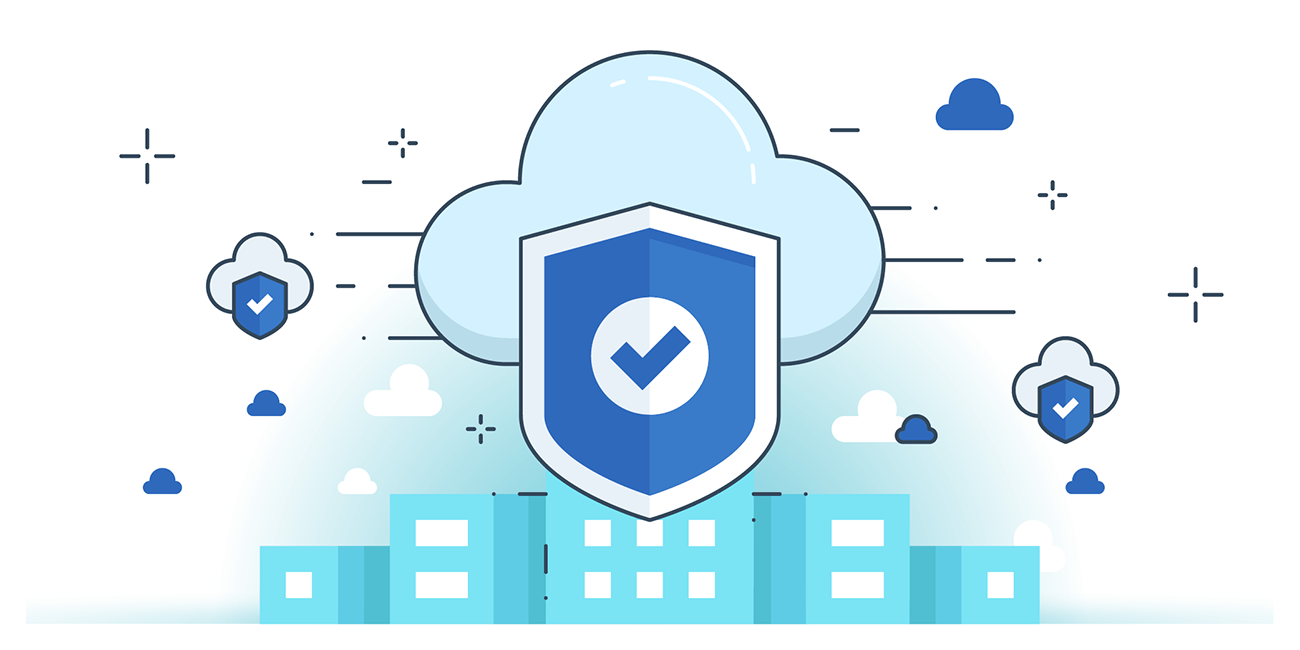Cloud computing requirements for SMBs and SMEs, these tools are giving them the power of a full data center without the need for on-premise management. Public cloud providers, such as Amazon AWS, IBM Cloud, Microsoft Azure, and Google Cloud Platform, use the internet to offer their computing services. Private cloud services are available as well, though they can be costly. For some, a hybrid cloud model is the best option. Whichever you choose, using a public cloud provider can be a budget-friendly option that provides the added convenience of remote cloud management and integrated security features.
However, not all cloud services are created equal, and it can be difficult to sift through them all to find the best service provider that fits your needs and your budget. Fortunately, there are several expectations businesses should have with any provider they choose, and starting with these can help eliminate companies that fall short. Whether you’re looking into infrastructure as a service (IaaS), platform as a service (PaaS), or software as a service (SaaS), your expectations should be the same.
Before we dig deeper on what specific requirements you would need for cloud computing, let us learn about what cloud computing is, uses and benefits for SMB’s and SME’s.

What is Cloud Computing?
Cloud computing is the delivery of computing as a service rather than a product. This means that all of your data, software, and applications are stored remotely on servers, accessed over high-speed internet connections. Cloud services can be either public or private, but they’re typically managed by third parties and delivered to you through various endpoints like websites or mobile apps.
There are three main types of cloud services: Infrastructure as a Service (IaaS), Platform as a Service (PaaS), and Software as a Service (SaaS). IaaS provides you with the infrastructure necessary to build or run applications, including servers, storage, and networking. PaaS provides you with a platform on which to develop and run applications, including the infrastructure, operating system, database, and middleware. SaaS delivers software applications over the internet to end users.
What is the Purpose of Cloud Computing for SMB’s and SME’s?
Cloud computing is an umbrella term for anything that involves delivering hosted services over the Internet. Cloud computing has become popular in recent years because it offers a number of advantages over traditional on-premises IT solutions. Cloud computing can be used for a variety of purposes by SMB’s and SME’s, including:
Storage
Cloud storage is a form of data storage in which the physical location of the data is not important and can be accessed from any computer or other device connected to the Internet. It is a service that stores your files on remote servers and you can access them anytime, anywhere as long as you have an internet connection.
It’s also called “cloud-based storage” or “online storage.” Cloud storage is a popular way to store data because it is convenient and easy to use. You can upload your files to the cloud and access them from any device, anytime, anywhere.
Back up
Small businesses and entrepreneurs are increasingly moving to the cloud for a variety of reasons including cost savings, scalability, and efficiency. But one important consideration that is often overlooked is data backup and disaster recovery. When your business is in the cloud, you are responsible for backing up your own data. Here are some tips for the best cloud backup for small business are and how to do it effectively.
First, make sure you have a plan. Decide what data is most important to your business and develop a strategy for backing it up. Regularly scheduled backups are key-you don’t want to wait until there’s a disaster to start trying to recover your data.
Next, choose the right backup solution. There are a variety of cloud-based backup solutions available, and the best one for you will depend on your specific needs. Do your research and find one that meets your requirements.
Finally, test your backup plan regularly. Make sure your backups are actually working and that you can successfully recover your data. This is an important step that is often overlooked. By following these tips, you can ensure that your data is safe and secure in the cloud.
Cloud backup is a critical component of any cloud computing strategy. Small businesses and entrepreneurs must carefully consider their options and choose a solution that meets their specific needs. By following these tips, you can ensure that your data is safe and secure in the cloud.
Hosting
Cloud hosting is an attractive option for small and medium-sized businesses (SMBs and SMEs) because it offers a number of benefits, including scalability, affordability, and flexibility. In order to be eligible for cloud hosting, a business must meet certain requirements.
One of the most important requirements for cloud hosting is that the business has a good internet connection. Without a fast and reliable internet connection, it will be difficult for the business to take full advantage of the cloud. Additionally, the business must have a certain amount of data storage space available. The amount of storage space required will depend on the size and type of business, but most businesses will need at least 10GB of storage space.
The business must also have a robust IT infrastructure in place. This includes things like a firewall, antivirus software, and a backup system. The cloud hosting provider will likely require these things in order to ensure the safety and security of the client’s data. Finally, the business must have a clear understanding of its needs and goals. This will help to ensure that the cloud hosting solution is the best fit for the business.
SAAS
What is a software as a service? Software as a service (SaaS) refers to the delivery of applications over the internet, rather than installing them locally on your computer. You don’t need to worry about updates, upgrades or virus protection because it all happens in the cloud.

What are the Benefits of Cloud Computing for SMBs and SMEs?
Cloud computing has revolutionized the way businesses operate, by providing a more efficient and cost-effective way to manage and store data. For smaller businesses, cloud computing can provide a number of benefits, including:
Reduced Costs
Cloud computing can help reduce costs for small businesses in a number of ways. First, by allowing businesses to pay for only the storage and computing power that they need, rather than investing in expensive on-premise hardware. Second, cloud computing can help reduce IT staff costs, as businesses can outsource the management of their cloud infrastructure to a third party provider.
Increased Scalability
Cloud computing can help small businesses quickly scale their operations up or down, as needed. This can be especially helpful during peak seasons or times of growth, when businesses may need more computing power, but do not want to invest in additional hardware.
Enhanced Mobility
Cloud computing can help small businesses access their data and applications from anywhere in the world, as long as they have an internet connection. This can be helpful for businesses that have employees who work remotely or travel frequently.
Greater Security
Cloud computing can help small businesses improve their security posture, as data is typically stored in multiple, geographically dispersed data centers. This can help reduce the risk of a single point of failure. In addition, many cloud providers offer robust security features, such as data encryption and identity and access management tools.
Data Backup and Recovery
Cloud computing can help small businesses automatically back up their data and applications, as well as quickly recover from disasters, such as power outages, hardware failures, or natural disasters. entire server customer service tools cloud services store right cloud backup service own internal it team data stored remote desktop hosting multiple servers same server mobile devices
Improved Collaboration
Cloud computing can help small businesses improve collaboration among employees, as they can share files and documents in real-time from anywhere in the world.

What are the Challenges of Cloud Computing for SMBs and SMEs?
Despite the many benefits of cloud computing, there are a few challenges that small businesses should be aware of, including:
Security concerns
As with any data storage solution, there is always the potential for data breaches. However, by choosing a reputable cloud provider, businesses can minimize this risk.
Lack of control
When businesses store data and applications in the cloud, they are relinquishing some control over those assets to the cloud provider. It is important to understand the terms of service agreement before signing up for a cloud solution.
Integration challenges
If a business has a complex IT infrastructure, integrating a cloud solution can be challenging. It is important to work with a provider who can help with the integration process.
Data residency concerns
Businesses that are subject to data residency restrictions (e.g., in the European Union) need to ensure that their data will be stored in a data center located within their jurisdiction.
Cost
The pay-as-you-go pricing model of cloud computing can be helpful for small businesses, but it is important to understand the costs before signing up for a solution. Otherwise, businesses may find themselves with an unexpectedly large bill.
There are a few challenges that small businesses should be aware of before adopting a cloud solution. By understanding these challenges, businesses can make sure they choose the right cloud solution for their needs.
Cloud Computing Prerequisites for SMBs and SMEs
Cloud computing is a new way for SMBs and SMEs to get the resources they need without the high costs. But before you jump on board, there are some requirements that must be met first. Here are just a few of them:
1. High-Level Security and Data Privacy
Anytime you consider storing data on the public cloud, privacy and security should be a primary concern. Any cloud provider you consider should offer security features that exceed your own in-house capabilities without charging you for keeping your data safe. Security should be compliant with all applicable laws and should include full backup features with disaster recovery. Reputable companies will allow a thorough examination of their security systems.

2. High-Performance Cloud Computing
Businesses’ Cloud computing requirements and cloud services will only be as good as their infrastructure allows. Therefore, you should select a company that has storage systems, data centers, operating systems, and databases to keep up with current standards. An infrastructure that falls below the curve can impact your business operations negatively, making you less competitive in your industry. This also applies to the operation, maintenance, and security of the infrastructure the company has in place.
3. Rapid Deployment of Cloud Computing Services
One of the perks of virtualization is the ability to get your company online quickly. Cloud computing allows businesses to avoid an investment in, and installation of, on-premise hardware and software. Instead, everything should be ready to go, allowing you to resume business processes in a day or two. Time is money, so every day you’re offline without web services is a day you’re missing out on connections with your consumer base. The company you choose should be capable of rapidly deploying your requested services.
4. Transparent Pricing
Most SMB/SMEs operate on a strict budget. Although cloud computing is often suggested as a solution for this, it’s important to note that cloud providers have the potential to overcharge just like any other service provider. To prevent this, choose to work with companies that clearly outline their prices. You should expect no requirements to pay hardware and software licensing fees, and subscription services should be open about their pricing model. Cloud applications should also provide a clear outline of prices with no hidden fees. Reputable companies will be transparent about the costs associated with their cloud services.
5. Configurability
Another potential benefit to cloud services is the ability to configure your applications to exactly suit your business needs. Previously, this would require expensive customization, but now many cloud computing services offer the opportunity as part of their service. A healthy catalog of options should be available, allowing you to piece together a robust cloud environment that handles all your company’s processes.
SaaS solutions are designed to offer configurations that meet your company’s unique needs while allowing further configuration for different areas of your business.
6. Included Updates
Another benefit to cloud applications versus licensed software is the ability to update the applications simultaneously, ensuring you always have the latest version available. Traditional software requires automatic or manual updates for security purposes, but updates that offer new features have customarily often required a purchase. Any company you choose for your cloud applications should offer upgrades at no charge, guaranteeing all customers can remain competitive. Technically, software that’s hosted by the application vendor but requires customers to purchase upgrades is not classified as a cloud application. Having vendors handle the upgrades of their own software reduces the margin of error by business owners who may not have the skills or staff necessary to manage the upgrade themselves. For this, we recommend you get cloud service solutions.
7. Multi-Tenancy Cloud Computing Requirements
Multi-tenant cloud architecture improves many of the issues found with its single-tenant counterpart. In a single-tenant setup, a customer is solely hosted by a server, giving them complete control over elements such as data and security. Multi-tenant cloud computing allows several customers to share servers but have access only to their private space based on the permissions set. Customers who choose a multi-tenant option get the benefit of a greater variety of resources that don’t hinder privacy or security features, a greater share of cloud storage, and easier accessibility from multiple devices or locations. This also allows application upgrades to be sent to all relevant users at once, ensuring no one has a disadvantage due to outdated software. An added bonus is the positive impact on the environment. Choosing to share servers reduces the drain on physical resources while increasing access to computing resources.

8. Seamless Integration Assistance
Integration should be a key service offered by any cloud service provider you consider. If you’re making the transition to cloud infrastructure but already have existing infrastructure in place, assistance with seamless integration should be offered. This will allow your SMB/SME a transition into your desired computing model with minimal loss to functionality. Companies that share the burden of integration will likely have similar systems in place when you decide to upgrade your configuration, providing scalability of their service as well. For small businesses, this assistance can help them avoid the hassle of hiring private IT support specialists and making costly mistakes attempting to integrate on their own.
Small and medium businesses have different cloud computing requirements than large enterprises. SMBs need the ability to quickly scale their computer resources up or down as their business needs dictate, while SMEs require a higher level of security and compliance controls. If you’re looking for cloud computing solutions for Business that can meet your unique needs, contact us today. Our team of experts here at EIRE Systems can help you find the right solution for your business.
About the Author: EIRE Systems
EIRE Systems is a leading independent provider of professional IT, AV and Access Security services to the financial, insurance, manufacturing, health care, retail, construction, hospitality, commercial real estate, legal, educational and multinational sectors in Japan and throughout the Asia Pacific region. EIRE Systems has expertise across a wide spectrum of Information Technologies, with a track record for successfully completing hundreds of assignments since its establishment in 1996.


